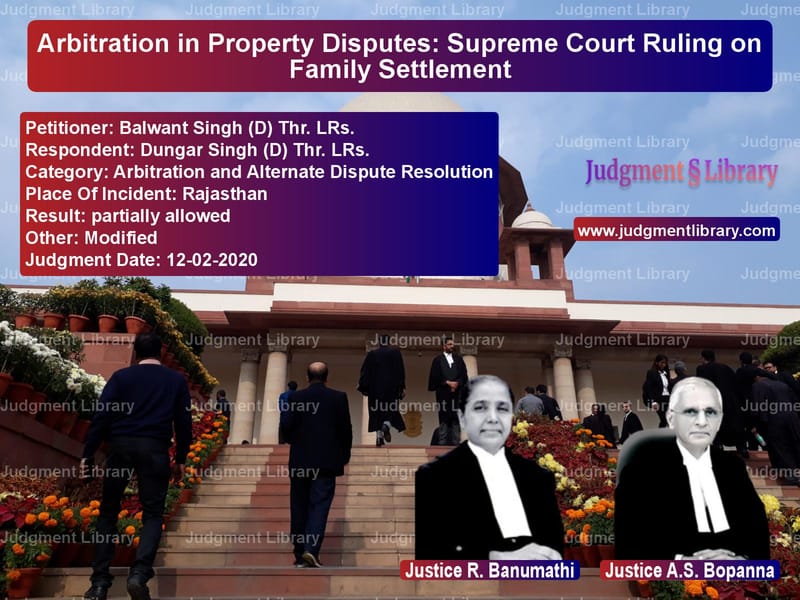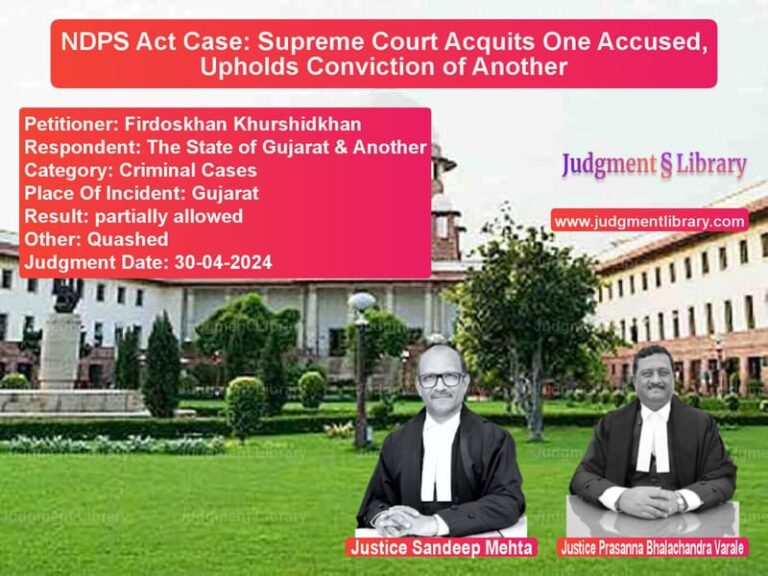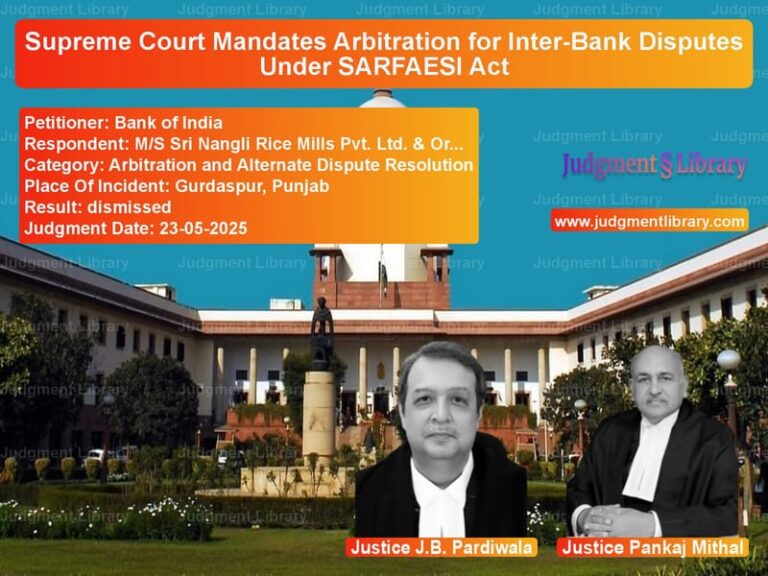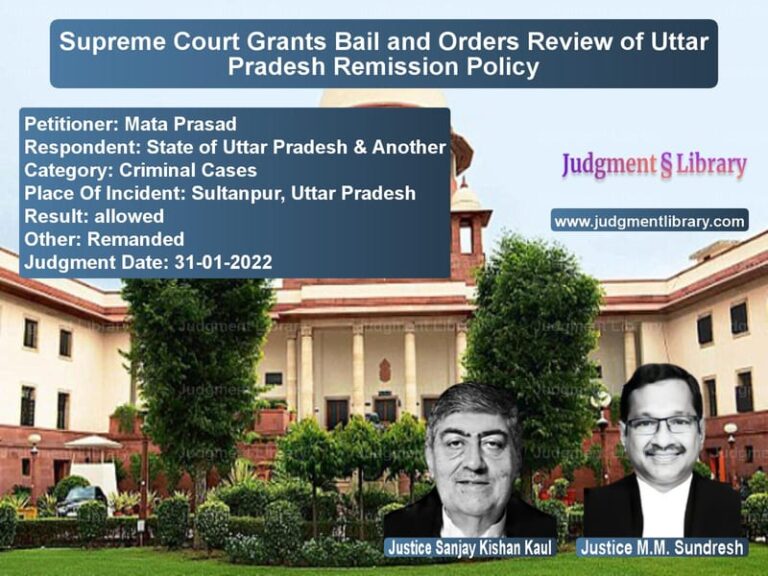Arbitration in Property Disputes: Supreme Court Ruling on Family Settlement
The Supreme Court of India recently ruled in Balwant Singh (D) Thr. LRs. v. Dungar Singh (D) Thr. LRs., addressing the validity and enforceability of an arbitration award in a family property dispute. The case revolved around whether the award, which settled a long-standing partition dispute between two brothers, should be upheld as binding.
Background of the Case
The dispute originated between Balwant Singh and Dungar Singh, who were real brothers. Following the death of their father, Jeet Mal Jain, disagreements arose regarding the partition of family properties. To resolve their differences, the parties agreed to arbitration and appointed three close relatives as arbitrators under an agreement dated November 23, 1981.
The arbitration award divided the family’s immovable properties, agricultural land, jewelry, and financial assets. The award was registered by the Collector (Stamps), Udaipur, on December 10, 1982. However, Balwant Singh later objected to the award, leading to a protracted legal battle.
Legal Issues
- Was the arbitration award valid under the Arbitration Act, 1940?
- Did the arbitrators act within their jurisdiction and authority?
- Were the proceedings conducted in a fair manner?
- Should the award be made the rule of the court?
Arguments by the Parties
Appellant (Balwant Singh’s Legal Representatives)
- The arbitrators hurriedly passed the award without giving Balwant Singh adequate opportunity to present his case.
- The award was not clear on certain points and did not provide a final settlement of disputes.
- One of the arbitrators was closely related to the respondent, raising concerns of bias.
- The award remained with one of the arbitrators for months before being signed and registered, which raised doubts about its authenticity.
Respondents (Dungar Singh’s Legal Representatives)
- The arbitration was conducted fairly, and both parties participated willingly.
- The arbitrators were mutually agreed upon, and no objections were raised at the time of appointment.
- The award was valid, duly registered, and should be enforced.
- The objections raised by the appellant were afterthoughts aimed at stalling the division of assets.
Decisions of the Lower Courts
Upon hearing the matter, the District Judge refused to make the award the rule of the court, citing concerns over procedural irregularities. The Rajasthan High Court, however, overturned this decision and upheld the award.
Supreme Court’s Analysis
The Supreme Court, comprising Justices R. Banumathi and A.S. Bopanna, examined the arbitration award, legal provisions, and previous rulings. The key observations included:
1. Validity of the Arbitration Agreement
The Court noted that both parties had willingly agreed to arbitration and had appointed the arbitrators themselves. The Court stated:
“Where parties agree to settle disputes through arbitration, the award must be given due sanctity, unless there is gross illegality or misconduct.”
2. Procedural Fairness
The appellant argued that the arbitrators rushed the decision. However, the Court found no evidence that Balwant Singh was denied a fair hearing. The Court emphasized:
“Arbitrators must act fairly, but minor procedural lapses do not vitiate an award unless there is serious prejudice.”
3. Role of Family Arbitrators
The Court rejected allegations of bias, noting that the arbitrators were mutually selected by the brothers and included close relatives from both sides. The Court observed:
“In family disputes, it is common to appoint relatives as arbitrators. This by itself does not imply bias or partiality.”
4. Registration and Enforceability of the Award
The Court acknowledged that the award had been registered in 1982 and no fraud was proven in its execution. The Court held:
“An award that has been duly signed, accepted, and registered should be upheld unless clear evidence of fraud or coercion is presented.”
5. Finality of Family Settlements
The Court emphasized the need for finality in family disputes, ruling that prolonged litigation over a freely agreed settlement defeats the purpose of arbitration.
Final Judgment and Modifications
The Supreme Court upheld the High Court’s ruling but introduced certain modifications based on a mutual settlement reached during the appeal:
- Balwant Singh’s legal representatives agreed to pay Rs. 10,00,000 to Dungar Singh’s legal heirs for their share of jewelry.
- The land in dispute could be pursued by Dungar Singh’s heirs in litigation against third parties.
- The ownership of houses and agricultural land was finalized as per the arbitration award.
- The division of financial assets and utensils remained as per the original award.
Key Takeaways
- Arbitration awards in family disputes hold strong legal value and should be respected unless proven to be unfair or illegal.
- Relatives as arbitrators do not automatically indicate bias, especially when both parties agree to their appointment.
- Registered awards carry legal sanctity and cannot be easily challenged.
- Mutual settlements reached in the Supreme Court can provide finality to long-pending disputes.
Conclusion
The Supreme Court’s ruling in Balwant Singh (D) Thr. LRs. v. Dungar Singh (D) Thr. LRs. reinforces the importance of arbitration in family property disputes. By upholding the award and facilitating a final settlement, the Court has reaffirmed that arbitration is an effective and legally binding dispute resolution mechanism.
Petitioner Name: Balwant Singh (D) Thr. LRs..Respondent Name: Dungar Singh (D) Thr. LRs..Judgment By: Justice R. Banumathi, Justice A.S. Bopanna.Place Of Incident: Rajasthan.Judgment Date: 12-02-2020.
Don’t miss out on the full details! Download the complete judgment in PDF format below and gain valuable insights instantly!
Download Judgment: Balwant Singh (D) Th vs Dungar Singh (D) Thr Supreme Court of India Judgment Dated 12-02-2020.pdf
Direct Downlaod Judgment: Direct downlaod this Judgment
See all petitions in Arbitration Awards
See all petitions in Settlement Agreements
See all petitions in Dispute Resolution Mechanisms
See all petitions in Judgment by R. Banumathi
See all petitions in Judgment by A. S. Bopanna
See all petitions in partially allowed
See all petitions in Modified
See all petitions in supreme court of India judgments February 2020
See all petitions in 2020 judgments
See all posts in Arbitration and Alternate Dispute Resolution Category
See all allowed petitions in Arbitration and Alternate Dispute Resolution Category
See all Dismissed petitions in Arbitration and Alternate Dispute Resolution Category
See all partially allowed petitions in Arbitration and Alternate Dispute Resolution Category







